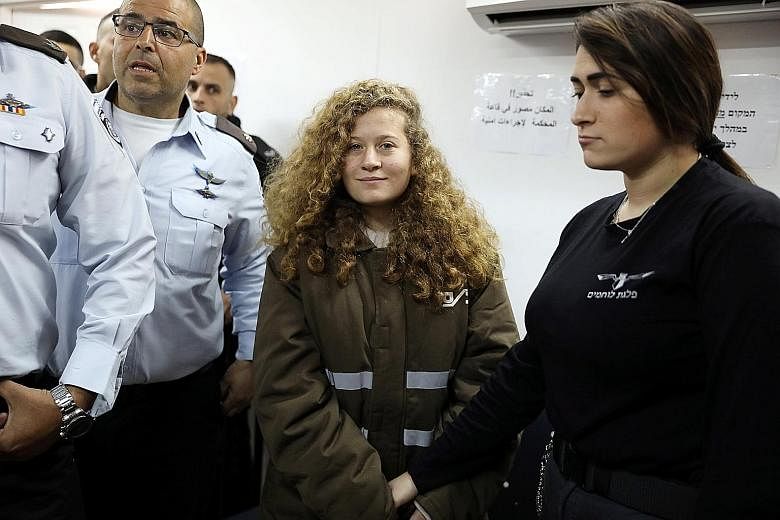Ahed Tamimi is only 16, but has already achieved global fame - or notoriety. Hundreds of thousands have shared videos of this Palestinian teenager on the Internet. Some celebrate her as Palestine's Joan of Arc, while others view her as the embodiment of Palestinian extremism.
So far, only one thing is certain: The blonde and blue-eyed media-savvy teenager has heightened a long-running dilemma for Israeli generals. How do you control a hostile population as an occupying power without strategically harming your international image?
Ahed's newest claim to fame begins with a video that documents an altercation in front of her house in the village of Nabi Saleh in the West Bank, which Israel has been occupying since the 1967 Six-Day War.
Several days before the video was shot on Dec 15 last year, United States President Donald Trump had recognised Jerusalem as Israel's capital. That enraged Palestinians, who claim the eastern part of the city as the capital of their future state.
As tensions mounted, Palestinians turned weekends into "days of rage", with demonstrators clashing violently with Israeli security forces. It raised the spectre of another popular uprising, or intifada.
Israeli generals prescribed utmost restraint. Soldiers were ordered to use violence as sparingly as possible so as not to escalate the situation.
On Dec 15, some Israeli soldiers searched Ahed'shouse for youths who had thrown stones at passing vehicles. Two stayed in her front yard to keep watch. Ahed and her cousin approached the two sentries, yelling: "Get out of here! Leave!"
First, Ahedpushed an officer lightly. Her cousin filmed the incident with her cellphone.
Encouraged by the officer's passivity, Ahedkicked and slapped him in the face repeatedly. The officer kept his calm.
The teenager's mother later intervened and the soldier retreated.
Things could have ended here in victory for both sides. Ahed had a video she could post online to prove her courage. The Israeli army succeeded in preventing a descent into more violence.
Yet as the video received wide coverage in Israel, it caused an uproar. Ministers criticised the army, claiming the officer did not display restraint but dangerous defeatism. Critics said many would follow Ahed's lead if she was not made to pay for her violent conduct.
Days later, Ahed, her cousin and her mother, who had also filmed the incident and published it online, were arrested. A military court ordered Ahedto remain under arrest until the end of legal proceedings. She faces 12 charges, among them for throwing stones and aggravated assault, and could face up to 14 years in jail.
During the proceedings, her case turned into a cause celebre that put the Palestinian question back in the international limelight.
The European Union uttered its "deep concerns" over the arrests of Palestinian minors. Children have played a central role in the Palestinians' struggle against Israel's occupation since the onset of the first intifada in 1987. They often man the front lines in clashes with security forces, encouraged by activists and sometimes even their own parents.
The Israeli army knows that confrontations with minors damage its image, but still feels obliged to employ drastic measures to curb the problem since, in some cases, stones thrown by youngsters have injured or even killed Israelis.
About 350 Palestinian minors are in Israeli jails. Many will stand trial in military courts whose conviction rate approaches 100 per cent and which can impose draconian verdicts.
Ahed's case therefore only stokes a new debate about an old problem. Some demand that she be punished sternly, citing how she is from a family that has become associated with the struggle against Israel. Over the years, she has appeared in videos in which she confronts soldiers violently. But by sentencing her severely, Israel risks turning her into a powerful symbol that could motivate thousands to rally for her release.
Yet, releasing her also comes with dangers. Herhumiliation of an officer on duty could inspire thousands of other Palestinian youngsters to follow her example.
That could lead to more violence. It seems that by turning a small incident into a high-profile case, Israel's generals have left themselves with no path to victory.

